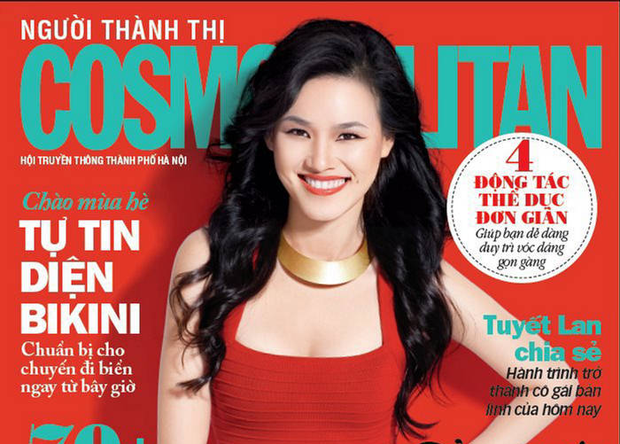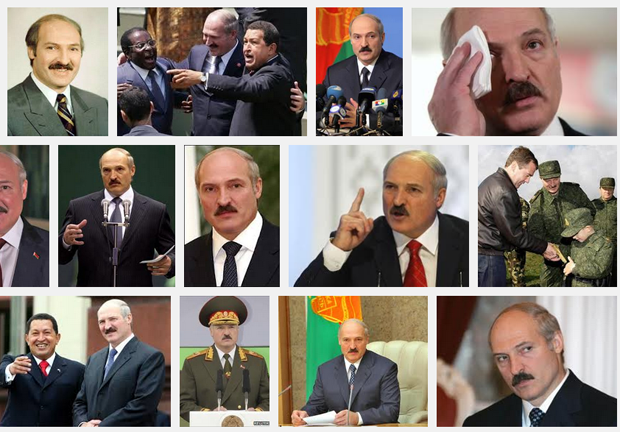5 Nov 2013 | News, Religion and Culture, Vietnam

In late October blogger Dinh Nhat Uy became the first activist sentenced in Vietnam for his Facebook posts, or, more specifically “abusing democratic freedoms” via Facebook (the much-used Article 258 of the legal code). Uy received a 15 month suspended sentence and in that regard he is luckier than the legion of bloggers, writers and activists who have been sent to prison or rehabilitation centres by the government in recent years.
But it is not just bloggers and activists who fall under the government’s watchful eye. Cultural activities from web comics to concerts are also monitored, for sex as much as sedition.
On October 4 General Vo Nguyen Giap passed away at age 102. Two weeks later during the weekend of the war hero’s funeral, most television channels shut down as a mark of respect. The odd BBC report is blocked, sex – but not violence – is cut from many overseas films shown domestically and subtitles often substitute perceived offensive language with more innocuous words. That television, along with nightlife and karaoke, was essentially cancelled shows just how much the old general was revered, and how the government still controls much of the means of communication in Vietnam. Those TV stations which did keep broadcasting showed old revolutionary films.
Bloggers are regularly jailed for pointing out state failings. Journalists face myriad restrictions from the state-owned press. Protesters and those handing out leaflets or organising strikes are also jailed. Facebook, now accessible, was quietly blocked for years and there are still sites one needs a workaround to access. Transparency International, Reporters Without Borders, Human Rights Watch, even Barack Obama, all decry Vietnam’s lack of freedom of speech.
But did you know, you can’t write about blow jobs in women’s magazines? Art, music, pop stars, books, comics, web comics, blogs, foreign news, lifestyle magazines, television subtitles, newspaper articles, research, the findings of market research, unflattering film footage, photographs, song lyrics, religious events, religious books, tour guides’ scripts: all are censored and watched closely by authorities.
Sometimes it’s nothing more than the relevant ministry fining a singer a piddling amount for revealing outfits during a performance as it is “not in keeping with Vietnamese fine traditions”. This is duly reported by papers and websites on slow news days and invariably gives the singer in question more publicity.
This process is piecemeal, contradictory and opaque. Are many rules unclear and often not enforced to keep people on their toes? Or is it simply the uncoordinated and sometimes inept efforts Vietnamese bureaucrats are known for country-wide? It is hard to say.
Once, artists had to submit sketches of their proposed paintings not only before they were given paint. These days things are less draconian but more uncertain. Galleries still need approval before exhibitions are allowed to go ahead; sometimes galleries simply won’t have an official exhibition party. As one art insider said, “there is no one rule.”
September 2009’s Decision 97 doesn’t limit expression but research, to 317 pre-approved topics. One of its most immediate effects was to force the disbanding of the well-respected Institute for Development Studies, which did so of its own volition in protest. Its 16-person membership was made up of Party members and well-known intellectuals, not rabble rousers.
All books in Vietnamese must be, in theory and usually in practice, subject to vetting. Even the Quran when translated into Vietnamese and published locally had to be examined first, according to several ethnic Cham, who are adherents of Islam. There has even been the odd raid on foreign book stores, such as in 2012, to confiscate Lonely Planet Vietnam guidebooks which had maps of the South China Sea which, given the ongoing flare ups with China over disputed island territories, is very firmly referred to as the East Sea in Vietnam.
Randy Slocum runs a bookshop in a tourist town in central Vietnam. He recalled trying to import books when he first opened seven years ago. “When I imported my 3,000 books, they confiscated 450 titles for being ‘depraved and reactionary’. Mostly Harlequin romance novels if you can believe it. But they are also interested in religion, anything about the American War, things about revolution. But they refuse to give you a list of what is banned and they refuse to give reasons why certain books are taken.” It is worth noting that Slocum was at the mercy of the provincial authority, not a draconian arm of Hanoi’s Ministry of Tourism, Sport and Culture, which is largely responsible for much cultural oversight.
The only time cultural censorship reached much of an international audience was when Bob Dylan played Ho Chi Minh City in 2011. He, as he has so often, neglected to play ‘Blowin’ in the Wind’. Both Human Rights Watch and American columnist Maureen Dowd pilloried him for giving in to censorship from communist authorities. However sources close to the show’s organisers said 100 songs, including Blowin’ in the Wind, had been approved. In any case, Dylan’s allegory and circumspection might have made his meanings hard to catch for censors whose first language is not English.
One organiser said, “You have to understand, what the authorities are looking for is actually just profanity and overtly sexual lyrics. It is a moral thing rather than a political one.”
Whilst serious news journalists can face arrest for reporting on corruption, even lifestyle or expat magazines have to tread carefully.
The first issue of Cosmopolitan, which began its Vietnamese-language issue with a local publishing company a few years ago, had a handy guide of the effects of alcohol on one’s orgasm, illustrated by graphics of the ratio of wine glasses to fireworks (two or three drinks is the perfect amount; they start to sputter to nothing after that). The headline mentioned “love” (in those knowing quote marks), not sex.
More generally in this area of publishing words like “him”, “triangle” or, in English, “Mr Happy” (in an article on blow job technique) are employed. Even when the correct, medical terms are employed for the varied body parts censors still apparently refuse, saying it’s “too sensitive”.
“We try to be different many times but the government won’t let us. You cannot write this, it not go with traditional (sic),” an unnamed editor explained. She said the internet was different, plenty of people wrote about sex.
These magazines, by and large, appeal to the educated middle classes. These are the same people, it has long been supposed by optimistic liberals worldwide, who will be behind either a revolution or a gradual ease in political restrictions in any repressive regime. A rising and educated middle class is also a hope of the government as Vietnam tries to move into a middle income country status. Yet they’re not allowed to see a tattoo or a wine bottle in a magazine. The exception is SOME men’s magazines with barely dressed models, which are not uncommon.
Even magazines in English are wary. Vietnamese censors may miss the nuance in a bar review noting the number of friendly young women eager for your company, but a feature on issues sex workers face is problematic enough for editors to avoid.
Content which “abuses democratic freedoms” (Article 258) is never clearly defined but in practice can be anything that criticises the government. Content which “sabotages national fine custom and tradition” or is “not in keeping with Vietnamese tradition” can be anything from a pop star’s stupid hairstyle to art that is covertly critical of the government or ruling elites, but given more leeway here people often actually end up more confused and sometimes even more conservative as a result.
This article was originally posted on 5 Nov 2013 at indexoncensorship.org
5 Nov 2013 | Belarus, News

The status quo between the European Union and Belarus remains in place. The EU Council prolonged its present sanctions against Belarusian officials last week.
On 29 October 2013 the Foreign Affairs Council of the European Union extended its restrictive measures against Belarus for one more year.
“This is because not all political prisoners have been released, no released prisoner has been rehabilitated, and the respect for human rights, the rule of law and democratic principles has not improved in Belarus,” the press service of the EU Council reported.
The EU reiterated its policy of “critical engagement” with the Belarusian government. At the same time, it updated the list of persons and companies, subjected to the EU sanctions. Thirteen people and five enterprises — all belonging to a Belarusian businessman Vladimir Peftiev — were excluded from the list.
Two more officials were added to the ban list in return: Aliaksandr Kakunin and Yury Trutko, who are the chief officers of Babruysk Correctional Institution No. 2, a prison where Ales Bialiatski, a famous Belarusian human rights defender, is serving a 4.5 year term.
At the moment the EU ban list contains the names of 232 Belarusian officials, including President Alexander Lukashenko, who were involved in human rights violations. They are banned from travelling in the EU; all their possible assets in the European Union must be frozen. The EU ban list also includes 25 companies owned by Yury Chizh and Anatoly Ternavsky, who are sometimes called “the bagmen of the regime.”
The decision of the EU to exclude from the “black list” 13 people, who no longer occupy their positions within the authorities of the country, was criticised by some representatives of Belarusian civil society.
“The reason they were included in the list was their participation to certain extent in human rights violations. For instance, there are several judges who passed politically motivated sentences to civil activists, involved in peaceful protests against the election fraud on 19 December 2010. Despite the fact they left their jobs, none of them has publically announced he or she regrets what they did and they are sorry. The reason why those 13 people were on the list is still there,” Uladzimir Labkovich, an activist of the Human Rights Centre Viasna, told Naviny.by.
Andrei Yahorau, the director of the Centre for European Transformation, thinks there is nothing new in principle in the EU Council decision.
“The reasons for the restrictive measures are still there, so it is natural the EU went on with them. But the changes in the ‘black list’ are purely technical. The issue with the list is not the changes themselves, but the closed way of compiling the list and making these changes. As there are no clearly defined criteria for inclusion to or exclusion from the ban list, such decisions give way to questions and unnecessary speculations,” Andrei Yahorau told Index.
The authorities of Belarus expressed a restrained approval to the EU decision. The Foreign Ministry welcomed shortening of the ban list, but stated the overall approach is still “anti-productive” and insists all sanction must be lifted. There is no change in attitudes towards the issues of human rights of the Belarusian government. For instance, on the day of the EU decision several journalists were detained in Minsk. The official delegation of Belarus confirmed once again at the session of the UN General Assembly in New York this week the authorities of the country do not recognise the mandate of the UN Special Rapporteur on the situation of human rights in Belarus, Miklós Haraszti, and are not going to cooperate with him.
The situation seems to be kept dead-locked, and Andrei Yahorau suggests Belarusian civil society “cannot blame the EU for the fact the situation in Belarus is not changing.” Despite the fact the European Union still lacks a clear and effective strategy towards the country, Yahorau believes “if no changes happen inside of Belarus itself, we should not expect anything from Europe.”
This article was originally posted on 5 Nov 2013 at indexoncensorship.org
4 Nov 2013 | Bahrain, United Kingdom
Britain is to send the Royal Air Force Red Arrows display team to perform Bahrain, just weeks after negotiations opened on the sale of BAE Eurofighter jets to the tiny Gulf Kingdom.
Bahrain’s ruling family has been engaged in brutal repression of protesters since a democratic uprising began i n February 2011. Britain has been repeatedly criticised for selling weapons and other military hardware to the regime while the crackdown continues.
Earlier today, Index reported the awarding of yet another international prize to the Bahrain Center for Human Rights, which has been battling peacefully for democracy in Bahrain under increasing repression since the uprising. The campaign group won the Norwegian Rafto Human Rights Prize.
Center leader Nabeel Rajab was imprisoned not long after accepting an Index on Censorship Free Expression Award in 2012, and remains in jail.
There have been dozens of violent deaths in Bahrain since the beginning of the uprising, many put down to the regime forces’ indiscriminate use of tear gas, which it is reported to be stockpiling.

A press release published on the Bahrain News Agency Portal today says:
One of the world’s premier aerobatic teams, Britain’s famous Red Arrows, is to display in Bahrain as part of a Middle East tour.
The team, with its nine distinctive red jets, will perform a series of precision formations and dynamic loops and rolls when it visits on Sunday, November 10.
[…]
The Team’s visit to the region has come about after accepting an invitation to the Dubai Air Show, where the Red Arrows will perform each day between November 17 and 21.
It is an opportunity being used by the Team to visit other nations in an important region, with which the United Kingdom has strong links to.
Indeed, Britain’s armed forces have a deep historical tie with Bahrain dating back over 200 years.
As ambassadors for the UK, the Red Arrows showcase the excellence of the Royal Air Force.
The team, which currently fly BAE Systems Hawk aircraft, consists of nine display pilots, all of whom are from frontline squadrons. Each has previously operated other Royal Air Force fast jets, such as the Tornado or the Typhoon multi-role combat aircraft
Bahrain has a great interest in the excellence of British hardware and expertise. As well as looking to buy an “unspecified number of Eurofighter Typhoon fighter jets”, Bahrain already imports hardware including weapons from Britain. Meanwhile, former senior Metropolitan police officer John Yates was engaged to advise the government on policing and dealing with civil unrest.
4 Nov 2013 | Bahrain, Middle East and North Africa, News

Maryam Alkhawaja accepts the Rafto Prize on behalf of the Bahrain Centre for Human Rights (Image: Lind and Lunde/Rafto Foundation)
The Bahrain Center for Human Rights (BCHR) was awarded the Rafto Prize for human rights at a ceremony in Bergen, Norway last night.
BCHR won for its peaceful fight for fundamental rights of freedom of expression and assembly in the Gulf kingdom, the award committee said.
Acting president of BCHR, Maryam Alkhawaja, was in Bergen to accept the prize. President Nabeel Rajab has been imprisoned since July 2012 for criticising authorities on Twitter. Marayam’s father and sister, Abdulhadi and Zainab, prominent human rights defenders in Bahrain, are also jailed for their opposition to the regime.
“The person who should be on this stage is not me but the people on the streets in Bahrain. They are the unnamed heroes,” Alkhawaja said in her acceptance speech.
She also read out a letter from Rajab: “Brutal violations are still continuing today against peaceful Bahrainis while the whole world continues to stay silent, especially Bahrain’s western allies. Our nation is a victim of being in an oil rich region and a victim of hypocrisies and double standards. Unfortunately, dictators of the gulf region succeeded in silencing governments of the free world in return for shortsighted economic and financial gains. Petrodollars have been able to silence global media and prevent them from revealing our people’s sufferings. We hope that with your support we can overcome this thick barrier as it has become so painful for our people to understand why the whole world deserves freedom and democracy except the small nations of oil rich countries in Gulf.”
The award committee echoed these sentiments: “This is a region where abuses too often are met with silence from western governments. Norwegian authorities have done nothing since expressing concerns in 2011,” said committee leader Martin Paulsen.
BCHR was established in 2002. It has played a vital part in Bahrain’s democracy uprising, now in its fourth year, in the face of the regime’s continued crackdown on opposition. BCHR won Index on Censorship’s Advocacy Award in 2012.
The Rafto Prize is awarded by the Norwegian Rafto Foundation. It is an increasingly influential human rights award, and a number of recipients have later gone on to win the Nobel Peace Prize.




